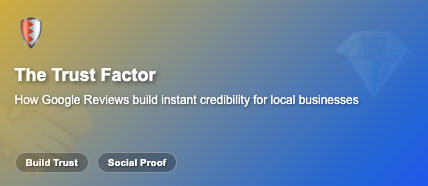Trust is the foundation of every business transaction, but in our digital age, trust must be earned before the first handshake or hello. Google reviews have become the primary way businesses establish credibility with potential customers, serving as digital testimonials that work around the clock to build confidence in your brand.
The Credibility Crisis of New Customer Acquisition
Every business faces the same challenge: convincing strangers to become customers. Without prior experience with your business, potential customers rely on external signals to determine your trustworthiness. In the past, this might have been a recommendation from a friend or an impressive storefront. Today, it's your Google review profile.
Think about your own behaviour when choosing a new restaurant, dentist, or service provider. You instinctively look for social proof – evidence that other people have had positive experiences. Google reviews provide this social proof in a format that's immediate, detailed, and seemingly unbiased.
The Psychology of Social Proof
Social proof is a powerful psychological phenomenon where people look to others' actions to determine appropriate behaviour. In business contexts, this translates to customers feeling more confident about choosing services that others have already validated through positive reviews.
When customers see dozens of positive Google reviews, their brain interprets this as evidence of consistent quality and reliability. They think, "If all these people had good experiences, I probably will too." This psychological shortcut helps them make decisions quickly in our information-overloaded world.
Conversely, businesses with few or no reviews trigger uncertainty and doubt. Potential customers wonder, "Why don't they have many reviews? Are they new, unpopular, or hiding something?" This uncertainty often leads customers to choose competitors with stronger review profiles.
The Numbers That Build Trust
Research shows that businesses need a minimum of 10-15 recent reviews to appear credible to most consumers. However, the magic number for optimal trust-building is closer to 50-100 reviews. At this level, potential customers perceive your business as established, popular, and consistently reliable.
The star rating is equally important, but it works in conjunction with review volume. A 4.3-star rating with 80 reviews builds more trust than a 4.8-star rating with 12 reviews. Customers understand that a larger sample size provides a more accurate picture of what they can expect.
Recent Reviews Signal Active Business
The recency of reviews is another crucial trust factor. Customers want to see that your business is currently active and still providing good service. Reviews from six months ago are less compelling than reviews from last week. Regular, recent reviews suggest that your business is thriving and consistently delivering positive experiences.
This is why businesses that generate reviews consistently have a significant advantage over those that rely on sporadic, organic review generation. A steady stream of fresh reviews signals to both customers and Google's algorithm that your business is active and engaging with customers.
Detailed Reviews Build Deeper Trust
While star ratings provide quick visual validation, detailed review content builds deeper trust. When potential customers read specific comments about your service, cleanliness, staff friendliness, or product quality, they can better envision their own experience. These details help customers feel more confident that your business will meet their specific needs and expectations.
Businesses that encourage customers to share specific details about their experience tend to build stronger trust profiles. Generic "great service" reviews are positive but less persuasive than detailed accounts of exceptional experiences.
Responding to Reviews Amplifies Trust
How businesses respond to reviews – both positive and negative – significantly impacts trust-building. Customers pay attention to whether businesses acknowledge feedback, show appreciation for positive reviews, and handle negative reviews professionally. Active engagement with reviews demonstrates that your business cares about customer experience and is committed to continuous improvement.
Businesses that ignore reviews miss an opportunity to build additional trust and show potential customers how they handle feedback and customer relationships.
The Competitive Trust Advantage
In competitive markets, trust often becomes the deciding factor between similar businesses. When customers compare multiple options with similar services and pricing, the business with the stronger review profile typically wins. Google reviews provide a competitive advantage that compounds over time – each new positive review makes it easier to attract the next customer.
Building Trust Systematically
The most successful businesses understand that trust-building through reviews requires systematic effort. They don't leave review generation to chance; they create systems that make it easy for satisfied customers to share their experiences. This might involve follow-up communications, review request cards, or technology solutions that streamline the review process.
The businesses that consistently generate more reviews are the ones that integrate review requests into their customer experience workflow. They understand that every satisfied customer represents an opportunity to build more trust with future customers.
Trust remains the foundation of business success, but the methods for building trust have evolved. Google reviews now serve as the primary trust-building tool for local businesses, working continuously to convince potential customers that your business is credible, reliable, and worth choosing over competitors.





